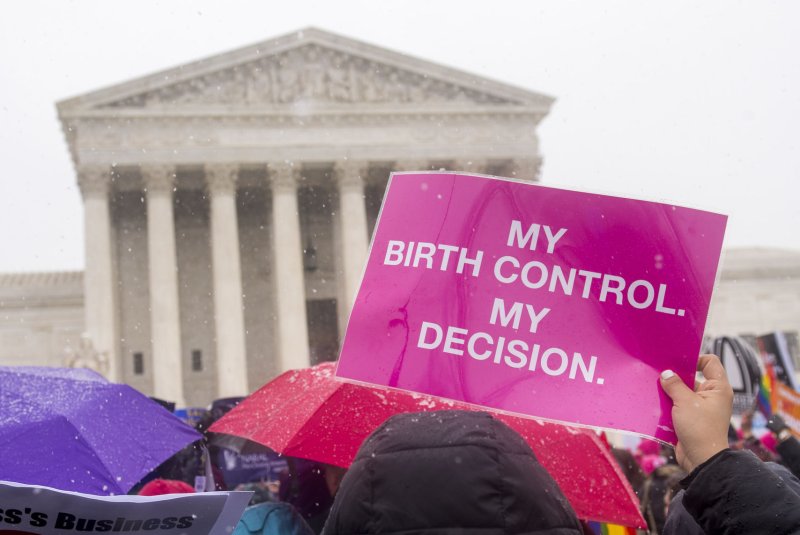Women's rights advocates participate in a rally in front of the U.S. Supreme Court as the high court considered two cases involving religious objections to the birth control mandate in the Affordable Care Act. Wednesday, the court appeared split on the matter without a ninth justice on the bench to replace the late Antonin Scalia. File photo by Kevin Dietsch/UPI |
License Photo
WASHINGTON, March 23 (UPI) -- Without a ninth opinion to tip the scales, it appeared Wednesday that the U.S. Supreme Court is split down the middle in deciding a legal challenge that questions an Affordable Care Act mandate that all non-theological entities must pay for birth control coverage for employees.
The high court appeared deadlocked Wednesday in the case of Zubik v. Burwell -- a challenge filed by a religious-affiliated nonprofit that considers it unfair how religious institutions themselves are exempt from the mandate, but not parties strongly influenced by religion.
The eight current justices heard 90 minutes of arguments Wednesday, appearing split evenly along ideological lines -- four conservative judges in favor of the challenge and four liberal judges against it.
The split indicates that the issue may not be settled until the ninth justice -- in succeeding the late Antonin Scalia, who died last month -- takes a seat on the bench, which could still be a year away.
The ACA's requirement that employers pay for birth control coverage has long been controversial. Houses of worship, such as the Catholic church, for example, are entirely exempt from the mandate -- and do not have to share the cost of the coverage. Affiliated parties, though, are not exempt -- leading some to feel they are, directly or indirectly, financing birth control.
The only option available to non-exempt groups is to effectively "outsource" to a third party the providing of birth control, so the objecting party isn't directly facilitating the coverage. That layer of insulation, though, fails to satisfy some of those up against the moral dilemma.
More than two dozen religious groups, including charities and hospitals, are objecting to the mandate. They say it forces them to choose one of two unattractive options -- either pay for the coverage, or drop coverage for employees altogether and face large financial penalties from the government.
"The petitioners use the phrase 'hijacking,' and it seems to me that's an accurate description of what the government wants to do," conservative Chief Justice John Roberts said Wednesday, referring to the health plans in question.
"Do you question their belief that they are complicit in the moral wrong?" conservative Justice Anthony Kennedy asked. "It seems to me that that's a substantial burden on their religious beliefs."
Justice Samuel Alito, another of the court's conservatives, questioned why the ACA couldn't offer another, less-conflicting alternative for religious-affiliated groups.
Liberal Justice Stephen Breyer said that religious people who are members of society must often do things they find objectionable, the Philadelphia Inquirer reported.
"It can't be all 'my way.' There has to be an accommodation, and that's what the government tried to do," liberal Justice Ruth Bader Ginsburg added.
The case is the fourth involving a challenge to the Affordable Care Act to be heard by the high court. In January, justices declined to hear a challenge to the law which claimed Congress violated the Constitution when it passed the law in 2010.















